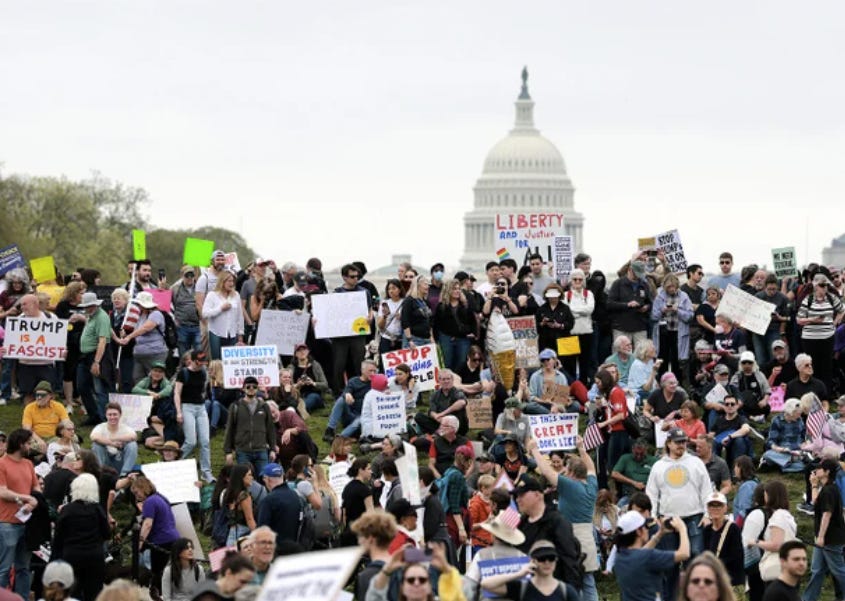I Didn’t Want to Write This Paper
Wrestling with Love, Neighbors, Enemies, and the Fight for Our Souls
It was while I was somewhere over the Atlantic Ocean that I became aware of the cat fight.
Or perhaps, more accurately, the DOG(E) fight.
Waking up from my nap on the plane—on the flight home from Rome to Boston—I decided it was time to catch up on the news. (For more about my impressions of my visit to Rome, see here and here.)
I hesitate to reduce anyone to a label. But it’s hard not to view the behavior of certain public figures as immature, self-aggrandizing, and frighteningly dangerous, especially when the stakes are this high.
I’ve always tried not to rubberneck… at least, not too much. I feel uneasy taking in another person’s misfortune as a form of entertainment. That may be why gossip has always made me uncomfortable, too.
So I find myself holding a strange mix of feelings as the news continues to report on the public unraveling between two grown-up, narcissistic, and very dangerous boys.
Correction: it’s not just the news media reporting; it’s these men themselves, airing their grievances, picking their fights, and performing their power struggle in full view of the public. Whether we feel voyeuristic or vindicated (or both), we can’t look away.
As much as I might prefer to close my ears to this noise, we can’t afford to. This conflict isn’t just theater; it affects us here in the U.S., and it ripples out into our relationships and responsibilities across the globe.
What do we do about this unholy mess?
We keep doing what we can: showing up at protests; boycotting Musk's businesses (since he has collected all that personal information about each of us); writing and calling our senators and representatives; loudly shaming ICE operatives whenever they kidnap our neighbors (without illegally interfering, which would accomplish nothing); speaking up over and over again, until this nightmare ends.
Which it will. It just has to end. We will stand together and not allow the US to devolve into a full-scale autocracy.
(Washington DC protest. Found at https://www.cbsnews.com/pictures/hands-off-americans-across-country-protest-trump-musk-doge-photos/10/)
But we must also confront several facts.
First, in some way, shape, or form, we are all complicit in creating the conditions that have brought us to this place, which caused just enough people to vote the way they did. I am in prayer each day, both for personal revelation, so I can understand where my blind spots are, and for communal revelation as well.
Second, the slippery slide toward the government we are now experiencing (or lack of effective government) has created what seems to be “enemies” among us.
As I shared in my talk in Rome, when we go into enemy mode, it's because we feel threatened.
Those supposed enemies are our elected representatives and other leaders, our neighbors, and even our family members.
(By DDRockstar)
How did that happen? And if I am truly a follower of Jesus, how do I not only love my neighbor, but also my enemy? Especially when I often feel like it's “their fault” we're in this mess?
From Public Conflict to Personal Calling
That’s what I was thinking about on the plane, fresh off my time in Rome, where I had just given a talk on human flourishing, and was asked to consider what it really means to love my enemies.
The timing was more than coincidental. It felt like the Holy Spirit was pressing the question deeper: What does it mean to follow Jesus not just in principle, but in practice, especially when the stakes are high and our divisions feel personal?
The reason I went to Rome last week was to give a paper at the Makarios conference. The program book explains, “The conference promotes research and discussion of the relationship between Christianity and human flourishing in historical and contemporary perspective, and across the humanities and social sciences.”
This was the second biannual conference about human flourishing sponsored by these prescient academic organizations:
The Human Flourishing Institute at Harvard University
The Institute for Religion and Critical Inquiry at Australian Catholic University (the host for our conference in Rome)
The Lonergan Institute and the Colloquy in Historical Theology at Boston College
The Institute for Studies of Religion at Baylor University
The conference theme was “Love of Neighbor and Human Flourishing”. (The Greek word makarios means “blessed,” “happy,” or “fortunate.” It indicates a state of well-being or flourishing.)
When I submitted an abstract in December to apply to speak at this conference, I knew what my “take” on the topic would be: we must know ourselves well before we can love others well, and that includes knowing ourselves as God's beloved children. My abstract was accepted, and I immediately started working on the paper.
I had the outline and the opening well in hand by the end of January. But by then, the second semester of the second year (out of three years) for my doctoral program had begun, and it wasn't long before I had to put this paper aside while I became immersed in the weekly readings, writings, and project research necessary to keep up with assignments.
As soon as I could, I began working on the paper again, getting feedback from my mentor, Trevor Hudson, a very wise white South African pastor who lived and pastored through apartheid and the subsequent changes in that country. I shared with him the sadness, anger, and confusion I have felt for months about the changes we are experiencing in the US.
When the Call Gets Personal
A few weeks before I left for Europe, as we went over the paper, he gently invited (challenged 😉) me to write more deeply about what was disturbing me. How do I not only love my neighbor, but also my “enemy”? Because of his background, I listened to him. He has deep, personal experience with the struggle of these types of questions.
So I did. I wrote about what Jesus may have meant when he said to love our enemies.
I wrestled with this question. I wept over it many times. God was stretching me in ways I didn't want to stretch. Like the public fight between the grown-up, narcissistic, dangerous boys, I didn't want to face it.
But I did. It's not perfect, but it is personal. It's where I am right now. Well, more accurately, it's where I'm being invited to journey right now, because much of the time it feels more aspirational than achievable.
But I believe that's ok, because I'm not alone on this journey. I know I am an imperfect image-bearer of Christ, but He walks with me anyway. He reminds me through Trevor's words that “Each person is sitting next to their own pool of tears.” That reminder keeps me humble.
I may get frustrated with or angry at people for what appears to me to be their hardheartedness and lack of empathy. I forget that they, too, are struggling with their own deep-seated fears and sadnesses, and need the Spirit of Christ to walk with them and transform them from the inside out… just like I do.
And the Spirit also reminds me of the great tension in the message from 1 Peter 5, that somehow, we must be humble leaders (shepherds), yet still stand firm for truth, justice, and love. What does it look like when we are both humble and resolute?
(By fizkes)
An Invitation to Walk Together
Would you like to see the fruit of my wrestling with these questions and invitations?
Are you, too, struggling with how—and when—to show up and speak up? I’m beginning to see what it can look like in my life. What might it look like in yours?
I invite you to walk this journey with me, at least as far as I’ve come this week.
Here’s the video of my talk:
If you prefer reading, here’s the text of the talk, along with a more succinct outline and the full academic conference paper on which the talk was based.
I would be honored to hear your thoughts, especially about how Jesus’ call to love our neighbors (and our enemies) challenges, stretches, and perhaps even transforms you. What does this look like in your own relationships, communities, and convictions?
Thank you for engaging with me on these critical questions as we all seek, by the grace and power of the Holy Spirit, to become ever more like Jesus Christ. Imperfect though we are, He walks with us, and reminds us that even in our enemy-making world, we are called to be makers of peace.
Let’s keep walking. Together.






